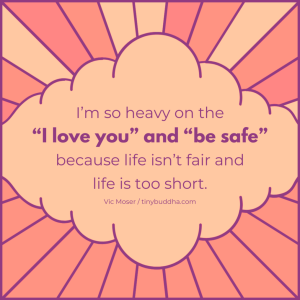“Do not anticipate trouble, or worry about what may never happen. Keep in the sunlight.” ~Benjamin Franklin
Have you every worried yourself to the point of emotional, even physical exhaustion?
Do you often feel stuck, anxious, or mistrustful of the world around you?
I know what it’s like to feel trapped by worry—in fact, I have always been a chronic worrier.
I worried and obsessed mostly about the hypothetical, the imaginary, the infinite variety of “what-if” scenarios. Eventually, I convinced myself that if I worried about every conceivable thing that could go wrong in my life, I would either avoid them altogether or numb myself of their effects.
As time went on and responsibilities increased, the worries intensified. I became anxious about raising my children well. I worried about money, career, and what people thought of me.
Then one day, I experienced a mild panic attack. Feeling overwhelmed with all I needed to get done that day, I began to experience dizziness and intense feelings of fear.
For a moment, I felt like I was living in an altered reality as my legs wobbled beneath me, and my heart pounded in my chest. I quickly found a private place to sit until the feelings passed.
I knew this was a wake-up call. I needed to find ways to manage my worry and anxiety before it got worse.
Over the years, I’ve found that embracing the following five truths stops worry from spiraling out of control:
1. You are not your worry.
For a long time, I did what most people who worry do—I tried to make it stop. I quickly learned that trying to block thoughts of worry was like trying to stop a river from flowing.
I eventually learned a simple but profound truth that changed everything for me:
You are not your emotions.
This is the power of detachment. Not the detachment that tries to be stoic but the one that allows you to feel your emotions without identifying with them.
I began to apply this by observing myself non-judgmentally as I worried. As I continued to observe myself, I learned to be at peace with my inability to stop worrisome thoughts. But I also learned that I could change my response to those worrying thoughts for the better. The same can be true for you.
2. Worry cannot exist in the present.
We rarely worry about problems we presently face. Worrying is a future-oriented activity fueled by uncertainty and anticipation.
The truth of this realization was another game changer for me. As I reflected, I could see that all of my worries were about a future I could not control. What about the past? The only past events I worried about were the ones I feared would adversely affect my future.
Want to avoid worry altogether? Stay in the now. I learned to do this through mindfulness meditation. A simple mindfulness technique is to focus on your breath when you begin to drift away from the present. Let each inhalation and exhalation ground you right where you are.
3. Worry can be confined.
If you’ve ever struggled with worry, you know that it can easily consume your entire day. This happened to me regularly. Once I learned to accept my worry, I decided to confine it rather than allow it free reign over my life. I would set aside a limited amount of time to allow my mind to worry intensely on its latest subject. At the end of that period, I would let it go.
Want to confine your worry? Try scheduling ten to thirty minutes a day for worry. Use this time to visualize your anxious feelings, write them down, and come up with an action plan for dealing with the root causes of your worry. If the worry reappears outside this scheduled time, postpone it until the next worry period.
4. You can give away your worry.
Have you ever noticed that your worry intensifies the more you focus on yourself? In the past, I used my worry to draw myself inward. I focused on my own needs and ignored the needs of others. It rarely helped to reduce my worry.
One of the things I learned by observing myself was my tendency to forget about my worries when I worried about other people and helped them with their needs. I let the onset of worry be a signal to call a lonely friend or spend time with a loved one. I learned to give my worry away.
5. You are human.
The greatest source of my worry was my attempt to be superhuman. I was trying to be all things to all people. I worried incessantly about what they thought of me. Instead of beating myself up for not living up to everyone’s expectations, I decided to embrace my limitedness. I cannot please everyone, and I am at peace with this truth.
It’s Time to Take a Stand
I know it might seem hard for you to integrate these tips, especially if, like most of us, you’ve struggled with a long-standing habit of coddling worry rather than openly challenging it.
But you can break down this habit one step at a time. Imagine a life without the controlling effects of worry. A life where worry itself is controlled and confined. Imagine no longer being emotionally drained by worry so that you can be truly present to those you love.
Stand up to worry. Today.
Separate yourself from it. Confine it. And let it go.
About Cylon George
Cylon is a spiritual chaplain, musician, devoted husband, busy dad of seven, and author of Self-Love: How to Love Yourself Unconditionally. He blogs about practical spiritual tips for living well at Spiritual Living For Busy People. Sign up and get his free guided meditation on contemplating death to release your fears and live more fully.














 Though I run this site, it is not mine. It's ours. It's not about me. It's about us. Your stories and your wisdom are just as meaningful as mine.
Though I run this site, it is not mine. It's ours. It's not about me. It's about us. Your stories and your wisdom are just as meaningful as mine.